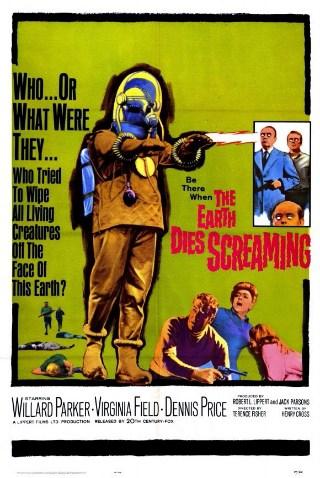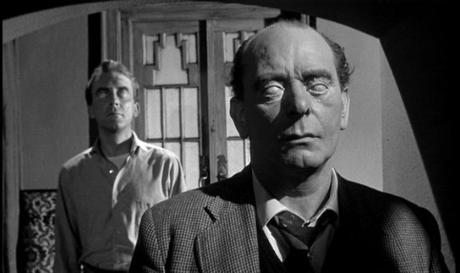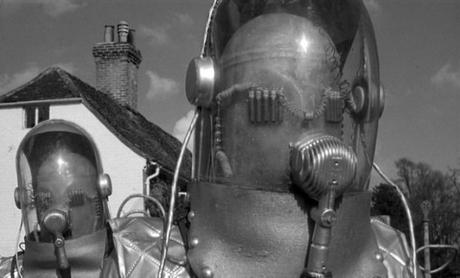
Continuing with the theme of lower budget British movies that I've been exploring of late, let's move away from the crime and noir genres featured so far and look at an area where it could be argued that a more frugal approach is likely to be more harmful. Conventional wisdom will tell you that Sci-Fi is hurt when the cash is in short supply, that the effects suffer and the cheese factor rises proportionately. Well once again, this conventional wisdom may be no more than prejudice wearing the mask of critical conformity. The Earth Dies Screaming (1964) is a film which was clearly made on the cheap, using a very small cast and with a running times which comes in at just over an hour.
A short running time means we need to cut to the chase at the earliest possible opportunity, and that's precisely how this movie begins. Vehicles go catastrophically out of control and derail,crash or drop out of the sky, people die abruptly and dramatically. As the title suggest, the Earth is dying, just not with a scream. Although we don't know why this is happening it's enough to know that it is, that we're witnessing an apparently inexplicable cataclysm. Yet there is a natural curiosity, a need to understand and try to make some kind of sense. And there's a feeling that this knowledge will come our way when we see Jeff Nolan (Willard Parker), grim-faced but comfortingly calm and driving along with an air of purpose. As he searches around the desolate village for a means of communication, anything which might raise a living voice anywhere, we get a taste of the enormity of his situation. For a time it looks like he might actually be the last man alive but there's only a limited amount of dramatic potential in such a setup. No, we need other people to interact with and provide the conflict without which no dramatic situation can truly exist. Enter Quinn Taggart (Dennis Price) and his traveling companion, Peggy (Virginia Field), representing treachery and romance respectively. Others also come on the scene - Thorley Walters and Vanda Godsell to bring some pathos, while David Spenser and Anna Palk are a simultaneously surly and hopeful vision of the future. So, as this small, disparate group gathers in the village inn to plan their next move, we get a hint of what may have happened and who (or perhaps what) was behind it.

The name of Terence Fisher must surely be familiar to even a casual fan of British cult cinema. It's hard not to think of Fisher without Hammer coming to mind, such was his intimate association with the studio. From the early crime and noir pictures of the early to mid 1950s right through to 1970s Fisher's name regularly popped up in the credits as director, frequently taking charge of some of their most famous and influential movies. The fact The Earth Dies Screaming was also produced by Lippert Films (one of the company's last titles), another recognizable collaborator with Hammer ties in with this feeling. However, that's all it is - a feeling - as the famous old British studio didn't have a hand in this one and had by this time gradually moved away from Sci-Fi, tending to favor (with the odd notable exception) their trademark Gothic horrors and psychological thrillers. Fisher's flair for and experience of handling pulpy, genre material such as this is evident throughout. There's a smoothness and confidence to the storytelling and it moves at a very comfortable pace. It's difficult not to make a comparison with Target Earth, which had been made in the US a decade earlier. That film had used a very similar premise but, in my opinion at least, nowhere near as successfully. The Earth Dies Screaming uses its limited locations to maximum effect and avoids looking any cheaper than absolutely necessary. More importantly though, there is no attempt to move beyond the small, tight-knit cast. This means the focus remains where it should, cuts out any superfluous distractions, and allows the viewer to become better acquainted with these people - all crucial factors in an hour-long feature.

In a film like this, where you have a frankly fantastic storyline, it's advisable to cast the kind of people who are capable of grounding it all, of keeping the histrionics to a minimum and ensuring that the notionally unbelievable attains a degree of credibility. Willard Parker had that careworn solidity about him, an aura of competence and cool dependability. The Earth Dies Screaming came near the end (he retired from the business after making only two more movies) of what had been a long and varied career for Parker. I wouldn't dream of arguing that he was the most exciting screen presence but, as I noted, that's not the quality this production called for. His wife Virginia Field was making her only cinema appearance opposite him - although a bit of research indicates the couple had appeared together in a number of television shows in the 50s - and also provides a collected and reassuring face. When our attention is on a beleaguered and bewildered group as is the case here, the dynamic works best when there is at lest one disreputable or dangerous member to stoke additional conflict. And it's difficult to think of anyone who fit the bill better than Dennis Price, a man who practically had a full-time job playing louche wastrels. The rest of the pared down cast perform admirably - Thorley Walters never disappoints anyway and only David Spenser comes across as mildly irritating, although I suspect that was part of his remit.
The Earth Dies Screaming has been available on a very nice-looking DVD from MGM in the US for a good many years and has recently made an appearance on Blu-ray too. While I've no doubt the BD will look excellent I can't say I'm dissatisfied with the old DVD and therefore haven't bothered to think about an upgrade. That disc has a clean and sharp print presented in the 1.66:1 ratio, and I have no complaints about it. I feel it's a marvelous little movie, of a type which challenges the idea of Sci-Fi requiring large amounts of money and jaw-dropping effects to be successful. If you haven't seen it, look out for it and give it a go.
